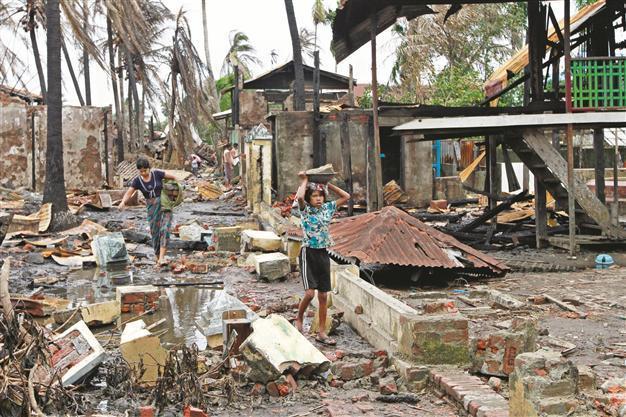UN calls for urgent probe into sectarian violence in Myanmar
YANGON, Myanmar

A girl and a woman carry useable bricks from damaged buildings in Sittwe. A top UN envoy has called on Myanmar’s government to find out the truth about the violence between Rohingya Muslims and Buddhists. AP photo
A top United Nations envoy voiced grave concern over alleged abuses by Myanmar security forces following sectarian violence in Rakhine State, and urged a full and credible state investigation.Tomas Ojea Quintana, the U.N. special human rights rapporteur, called on the government to find out the truth about violence in June between Rohingya Muslims and Rakhine (Arakan) Buddhists and address reports of extrajudicial killings and torture by its police and soldiers. “I am concerned ... at the allegations I have received of serious human rights violations committed as part of measures to restore law and order,” Quintana said in a statement at the end of a six-day visit to Myanmar, his sixth to the country.
He said it was a “matter of urgency” to set up an independent and credible investigation into the allegations of rights abuses. “While I am in no position to be able to verify these allegations at this point in time, they are of grave concern. It is therefore of fundamental importance to clearly establish what has happened in Rakhine State and to ensure accountability.” He is to present his findings to the upcoming U.N. General Assembly. Last month, Turkish Prime Minister Recep Tayyip Erdoğan and civil society organizations urged the United Nations to take action in the Arakan region. The conflict has exposed deep-rooted communal animosity and put the spotlight on promises by the government in office since 2011 to protect human rights after decades of brutal army rule.
‘State sponsored persecution’
In a report this week citing witnesses and interviews with 57 people in Rakhine State, the New York-based Human Rights Watch said there was evidence of “state-sponsored persecution and discrimination” against the Rohingya Muslims, who number at least 800,000 in Myanmar.
The report said security forces had carried out extrajudicial killings, arbitrary arrests, and torture, and had done nothing to intervene to stop the lynching of 10 Muslims by a Buddhist mob, which preceded a week of riots, arson and knife attacks that killed 77 people and displaced tens of thousands.
The government has rejected the allegations and said its forces exercised “maximum restraint.” Last week a minister confirmed that 858 people have been detained. Quintana also called for a review of 1982 laws that he said discriminate against Rohingyas and deny them citizenship and freedom of movement, to ensure they are in line with international human rights standards. The government insists those affected are illegal immigrants.
Quintana’s visit to Myanmar also focused on making an overall assessment of the country’s human rights situation, as the country moves down a reformist path under President Thein Sein, following decades of repressive military rule. Quintana met with opposition leader Aung San Suu Kyi, government officials, lawmakers and others.
There is reason to be encouraged by some recent changes, Quintana said, but pointed out the issue of political prisoners as an enduring obstacle to true democratization.
Compiled from Reuters and AP stories by the Daily News staff.
















